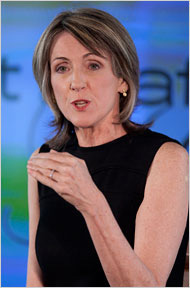
|  |  |  Editorials | Environmental | October 2009 Editorials | Environmental | October 2009  
Obama Aide Concedes Climate Law Must Wait
 Andrew C. Revkin - New York Times Andrew C. Revkin - New York Times
go to original
October 03, 2009


| | Carol Browner, director of the White House Office of Energy and Climate Change Policy, said a finished U.S. climate bill was unlikely before December's international meeting. (Andrew Harrer/Bloomberg) |  |
President Obama’s top climate and energy official said Friday that there was virtually no chance Congress would have a climate and energy bill ready for him to sign before negotiations on a global climate treaty begin in December in Copenhagen.

The remarks by the official, Carol M. Browner, during an onstage interview in Washington, were the first definitive statement by the administration that it saw little chance of Congressional passage this fall.

Lawmakers and environmental campaigners have cast similar doubts on the prospect in recent weeks, given the high priority put on health care legislation and the array of hearings that would be needed on the energy initiative, to say nothing of the time needed to reconcile competing versions of it. Climate legislation was introduced in the Senate only Wednesday, a full three months after the House passed its version.

“Obviously we’d like to be through the process — that’s not going to happen,” Ms. Browner said at a conference on politics and history organized by The Atlantic magazine. “I think we would all agree the likelihood you would have a bill signed by the president on comprehensive energy by the time we would go in early December is not likely.”

Yet Ms. Browner said it was possible that the Senate could at least complete its hearings on the bill by the time the international climate talks open on Dec. 7. Those hearings, along with the Obama administration’s recent moves toward regulating greenhouse gases, would provide evidence that the nation was serious about cutting emissions, she said.

A show of resolve by the United States about doing its part to combat global warming is considered critical to the outcome of the Copenhagen talks.

“We will go to Copenhagen and manage with whatever we have,” Ms. Browner said.

Later in the day, she issued a statement emphasizing that there was plenty for the United States to put on the table in the treaty talks.

“America’s leadership is clear,” she said.

To signal its determination, the administration announced Wednesday that it was planning new rules to regulate greenhouse gas emissions from hundreds of power plants and large industrial factories, regardless of Congressional action.

The Senate’s climate measure, sponsored by Senators Barbara Boxer of California and John Kerry of Massachusetts, seeks a 20 percent reduction from 2005 levels of carbon dioxide emissions by 2020. The House version seeks a 17 percent reduction. Both bills include a long-term target of an 83 percent reduction by 2050.

The legislation is exceptionally controversial, given the extent to which it would transform how the nation generates and consumes energy. It is already a focus of intense lobbying by industry groups that hope to defeat it or escape aggressive regulation and by environmentalists who want it strengthened.

Eileen B. Claussen, a negotiator in climate talks for the Clinton administration who now heads the Pew Center on Global Climate Change, said Ms. Browner’s remarks reflected the complexity of the Obama legislative agenda.

“The Senate is a huge challenge — not impossible, but difficult,” Ms. Claussen said. “What we need is for the health care debate to conclude, and the president and the entire administration to work constructively and tirelessly to pass climate legislation as soon as possible.” |

 |
|  |



